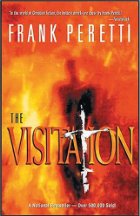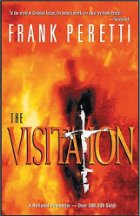Reality and The Supernatural In Peretti’s ‘The Visitation’
Fiction and poetry provide authors a unique way to glorify Christ that more overtly intellectual genres, like theology, simply can’t. These genres that aim directly for the heart and soul—rather than aiming at the heart through the mind—do not argue for belief, they show what it looks like and make you feel it. . . . They offer an author a way to give his beliefs flesh and blood by enacting them in the confusion of the real world. In fiction, belief is not what you look at, but what you look through.
Abraham Piper, How is Fiction True and Valuable?, Aug. 30, 2009
Say “Christian fiction,” and most people think in terms of extremes. The apocalypse thriller Left Behind series comes to mind, along with a dozen old jokes about how many volumes it has. Or one might think of an even greater multitude, which no one could number, of various romance genres — prairie, historical, cozy, comedic, medieval, prairie-historical, historical-medieval-cozy, etc. Recently, the top trends in Christian fiction are plain weird: Amish-community tales and (Twilight-influenced) vampire stories. (Don’t steal my idea to get rich: an Amish vampire novel.)
More rarely will someone think this about Christian fiction: extreme orthodoxy. Decades of flaky doctrines and Charles Finney-esque pragmatism has led to shallowness in Christian storytelling, to put it mildly. The “deep” themes of most stories are either Get Saved, or Have More Faith.
Even that wouldn’t be so bad if more Christians would write honestly about themselves. One may fault the Left Behind books or Frank Peretti’s thrillers for un-Biblical end-times or spiritual-warfare views. But at least they acknowledged a world where the Church exists. Not so with many other evangelical thrillers, mysteries or romances. Church, if it’s shown at all, is barely there. Apparently many evangelicals just don’t like to hold the mirror of fiction up to us. They’d rather write about prairie schoolteachers, police detectives with faith-crises, or Amish/vampires.
So it’s mostly for those reasons, I believe, that many young-restless-reformed types (what I affectionately term the Calvinistic Cabal, and I count myself among them) don’t have much place for Christian fiction. It’s trite, ripping off the world; its themes are shallow, and it doesn’t show Christ or His truth well. Reformed blogger Tim Challies, interviewed by Bob Lepine in a podcast about The Shack, was finally asked what other fiction he might recommend other than that. I just don’t read that much fiction, Bob, was Challies’ answer. I’m a Nonfiction Guy. Okay.
 My question: Why can’t a Gospel-driven Christian be both/and? C.S. Lewis has in-depth stuff, of course, but is there anything else?
My question: Why can’t a Gospel-driven Christian be both/and? C.S. Lewis has in-depth stuff, of course, but is there anything else?
I would submit that there is. And ten years ago, none other than Frank Peretti, that angels-vs.-demons thriller novel guy, wrote it — a 500+-page novel called The Visitation. Unlike other novels, it’s deep. It’s about the Church. And it’s about Jesus.
Doctrines, demons and deceptions
Most people know Frank Peretti for writing the blockbuster book This Present Darkness in the early ‘80s. Evangelicals loved Darkness and its sequel for its thrilling portrayals of angels vs. demons, Christians vs. Satanists, and plenty of creative spiritual battles. But many doctrine-minded Christians, loving and otherwise, also had concerns about what people were doing with Peretti’s stories. So did Peretti himself, according to a 1997 interview with World’s Gene Veith.
In prayer groups across the country, people were binding demons named after specific sins (Envy, Despair, Lust) and calling on angels to beat down devils in charge of particular cities and nations. “That really alarmed me,” Mr. Peretti told WORLD. People were taking his fiction literally, as if it were fact. [. . . H]e stressed that his books were symbolic, and that theological conclusions need to come out of the Bible rather than a work of fiction.
Veith went on to describe Peretti’s work-in-progress at the time. That became The Visitation. Unlike his previous stories’ portrayal of evil demonic strongmen, this novel focuses on inner demons. Rather than sweeping battles in spiritual dimensions along with prayer meetings and car chases, Peretti focuses on the turmoil of a former Pentecostal pastor in Washington State.
After a mysterious stranger comes to the small town of Antioch, Washington, burned-out pastor Travis Jordan is forced to review his past — partly because the stranger seems to know all about it. Even worse, the stranger claims to be “a new, improved version of Jesus.” He has televangelist-like charisma. He can perform real healings of diseases. He preaches love and tolerance. And he forms a religious movement that pulls in many, excepting Jordan and others.
Even more interesting, the false messiah has a personal mission: to ensnare Jordan himself. This minor-antichrist is convinced their stories are the same — that they both mistrust the Lord.
Thus, throughout doctrine deceptions, religious battles, and chapter-length flashbacks to past struggles and life changes, Jordan is forced to wrestle with the teachings of his youth, church authority abuses, why God didn’t heal his wife of cancer, and most of all, the real Jesus Christ.
Though The Visitation has plenty of characters in the third-person, most of it is written in the first-person. And based on accounts I’ve read, it’s also partly autobiographical. At the very least, one could say that no one who was not personally aware of more-charismatic practices, trying to find God’s will in “signs and wonders,” or fighting small churches’ stubbornness, could know the drama, trauma, and very often the comedic value, of these things.
For example, the foolish behaviors and gullibility of many charismatic women, who fall for the false Christ’s performances, are both comical and tragic — yet you as a reader never laugh so hard at the antics of people being “slain in the Spirit” or whatever that you forget to grieve over the real results of such feelings-based, un-Biblical ideas.
Along with fighting false teachings outside the church, Peretti’s protagonists also fight it within. Unlike other novels, this one has denominations, and without being preachy the author shows their excesses and where they get it mostly right — such as Baptists, Pentecostals, Lutherans, the other Baptists, and Presbyterians. As the townsfolk marvel and follow after the false christ, the consequences of their deception become dangerously clear.
A great theology book can debunk false doctrines well, or tell of such truth, about Who Christ is and how we follow and worship Him. Yet it takes a great fiction book to show ways this plays out in the real world. These can awaken new passions of the heart and for the true Jesus Christ — awakenings that can only come through God-glorifying stories.
The Visitation is one of the best I’ve found. My only regret is that there aren’t more novels like it. But maybe, once young-Reformed folks reach the fiction field, someday there will be.
(Originally published Oct. 28, 2009, on my church’s blog site.)





























Excellent post, providing much food for thought. Thanks for writing it.
Yes, The Visitation is either Peretti’s best work or very close to it. There is some cheesy dialogue towards the beginning but overall it’s a great novel that both challenges and explores the nature of the Church and show us how easy it is to fall prey to wolves if we aren’t rooted in God’s Truth, through Christ. Pity the movie ditched most of the character development and the subtlety of evil for mainly clichéd thriller/horror.
Try Ted Dekker. He’s written some thought-provoking fiction. Especially try Black, Red, White (his Circle Trilogy) and Boneman’s Daughters.